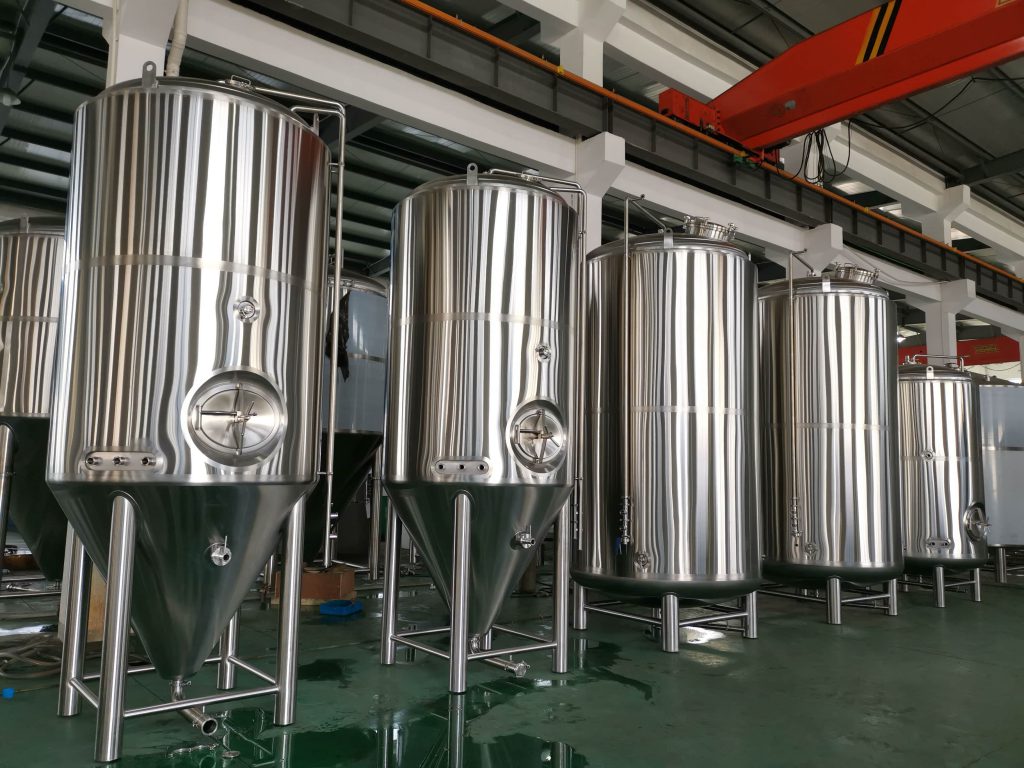Introduction

Stainless steel fermenters have become indispensable in modern brewing operations due to their myriad advantages over traditional materials like plastic or glass. This blog delves deep into the environmental benefits of utilizing stainless steel fermenters in brewing, emphasizing their sustainability, durability, and overall impact on reducing the industry’s ecological footprint.
Advantages of Stainless Steel Fermenters
Stainless steel fermenters offer a host of advantages that contribute significantly to their environmental friendliness:
Durability and Longevity
Stainless steel is renowned for its exceptional durability, capable of withstanding multiple brewing cycles without degradation. Unlike plastic or glass, which can deteriorate over time and necessitate frequent replacements, stainless steel fermenters have a lifespan that spans decades. This longevity translates into reduced material consumption and waste generation, contributing to a more sustainable brewing process.
Recyclability and Reusability
One of stainless steel’s most compelling environmental benefits is its recyclability. It is 100% recyclable without any loss of quality, ensuring that at the end of its long lifecycle as a fermenter, it can be melted down and repurposed into new stainless steel products. This closed-loop recycling minimizes the need for virgin materials, conserving natural resources and reducing energy consumption associated with raw material extraction and manufacturing processes.
Energy Efficiency
Stainless steel exhibits excellent thermal conductivity and retention properties, which optimize energy efficiency during both fermentation and cooling processes. Brewers can achieve precise temperature control with minimal energy input, thereby reducing overall energy consumption and greenhouse gas emissions compared to alternatives like plastic or glass.
Hygienic and Low Maintenance
The smooth, non-porous surface of stainless steel is easy to clean and sanitize, significantly reducing water and chemical usage during cleaning cycles. This ease of maintenance not only enhances operational efficiency but also minimizes environmental impact by lowering the volume of cleaning agents discharged into wastewater systems.
Environmental Impact of Stainless Steel Fermenters
The adoption of stainless steel fermenters contributes positively to various environmental metrics within the brewing industry:
- Resource Efficiency: By opting for stainless steel, brewers minimize the use of disposable materials that contribute to landfill waste. The long lifespan and recyclability of stainless steel reduce the need for frequent replacements, thereby conserving resources and mitigating environmental impact.
- Waste Reduction: Unlike plastic fermenters, which often end up as non-recyclable waste after use, stainless steel fermenters can be recycled indefinitely. This characteristic significantly reduces the volume of waste generated throughout a brewery’s operational lifetime.
Environmental Certification and Standards
Choosing stainless steel fermenters certified by recognized environmental standards is crucial for brewers committed to sustainability. Certifications such as ISO 14001 ensure that manufacturers adhere to strict environmental management practices throughout the production process. These standards promote resource efficiency, waste reduction, and responsible use of materials, aligning with sustainable brewing practices. By selecting certified fermenters, brewers can confidently minimize their ecological footprint while producing quality beer in an environmentally responsible manner.
Case Studies and Examples
Environmental Comparison Table

To illustrate the environmental benefits of stainless steel fermenters, consider the following comparative analysis:
| Environmental Factor | Stainless Steel | Plastic | Glass |
|---|---|---|---|
| Recyclability | 100% recyclable, closed-loop | Difficult to recycle, often single-use | Fully recyclable, but energy-intensive |
| Longevity | Decades of use | Short lifespan, frequent replacements | Long lifespan, potential reusability |
| Energy Consumption | Efficient thermal properties | High energy for molding, cooling | Energy-intensive manufacturing |
| Waste Generation | Minimal waste, recyclable | Non-recyclable plastic waste | Recyclable, but bulky and fragile |
Conclusion
In conclusion, stainless steel fermenters are not only beneficial for brewing quality beer but also contribute significantly to environmental sustainability in the brewing industry. Their durability, recyclability, and energy efficiency make them a preferred choice for reducing waste and minimizing environmental impact. By choosing stainless steel fermenters, brewers can uphold high standards of quality while promoting a greener brewing process.
FAQ
Q: Are stainless steel fermenters more expensive than plastic ones?
A:Stainless steel fermenters generally have a higher upfront cost but offer long-term savings due to their durability and reusability. This cost-effectiveness makes them a preferred choice for environmentally conscious brewers.
Q: How do stainless steel fermenters impact beer quality?
A:Stainless steel is non-reactive and inert, ensuring that it does not affect the taste or quality of beer during fermentation. It also prevents contamination, maintaining consistent brew quality.
Q: What maintenance is required for stainless steel fermenters?
A:Regular cleaning and sanitization are essential to maintain hygiene and extend the lifespan of stainless steel fermenters. However, their robust construction reduces the frequency of maintenance compared to other materials.

